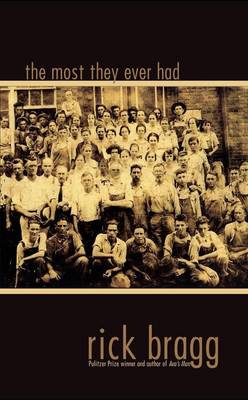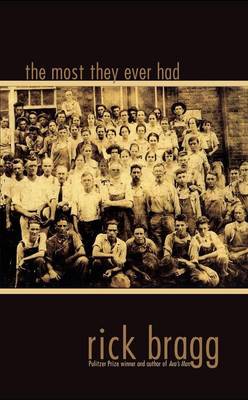
- Afhalen na 1 uur in een winkel met voorraad
- Gratis thuislevering in België vanaf € 30
- Ruim aanbod met 7 miljoen producten
- Afhalen na 1 uur in een winkel met voorraad
- Gratis thuislevering in België vanaf € 30
- Ruim aanbod met 7 miljoen producten
Zoeken
Omschrijving
In the spring of 2001, a community of people in the Appalachian foothills of northern Alabama had come to the edge of all they had ever known. Across the South, padlocks and logging chains bound the doors of silent mills, and it seemed a miracle to blue-collar people in Jacksonville that their mill still bit, shook, and roared. The century-old hardwood floors still trembled under whirling steel, and people worked on, in a mist of white air. The mill had become almost a living thing, rewarding the hardworking and careful with the best payday they ever had, but punishing the careless and clumsy, taking a finger, a hand, more. The mill was here before the automobile, before the flying machine, and the mill workers served it even as it filled their lungs with lint and shortened their lives. In return, it let them live in stiff-necked dignity in the hills of their fathers. So, when death did come, no one had to ship their bodies home on a train. This is a mill story--not of bricks, steel, and cotton, but of the people who suffered it to live.
Specificaties
Betrokkenen
- Auteur(s):
- Uitgeverij:
Inhoud
- Aantal bladzijden:
- 168
- Taal:
- Engels
Eigenschappen
- Productcode (EAN):
- 9780817356835
- Verschijningsdatum:
- 7/04/2011
- Uitvoering:
- Paperback
- Formaat:
- Trade paperback (VS)
- Afmetingen:
- 129 mm x 203 mm
- Gewicht:
- 204 g

Alleen bij Standaard Boekhandel
+ 44 punten op je klantenkaart van Standaard Boekhandel
Beoordelingen
We publiceren alleen reviews die voldoen aan de voorwaarden voor reviews. Bekijk onze voorwaarden voor reviews.








